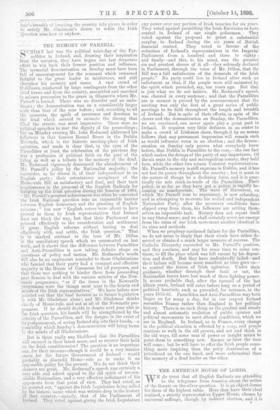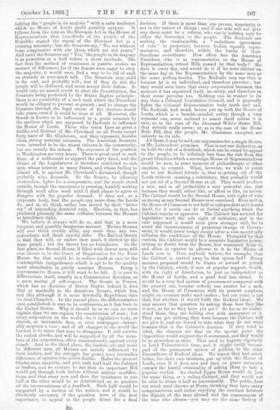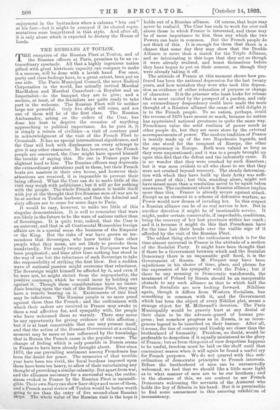THE AMERICAN HOUSE OF LORDS.
WE do trust that all English Radicals are attending to the telegrams from America about the action of the Senate on the silver question. It is an object-lesson for them of the highest value. Here they have their ideal realised, a strictly representative Upper House, chosen by universal suffrage, though by indirect election, and it is defying the " people in its majesty " with a calm insolence which no House of Lords could possibly surpass. It follows from the vote on the Sherman Act in the House of Representatives that two-thirds of the people of the Republic regard the repeal of the Sherman Act as a pressing necessity; but the Senators say," No, not without some compromise with our ideas, which are not yours." And until the Senators say "Yes," the people in its majesty is as powerless as a bull before a stout stockade. The fact that the method of resistance is passive makes no manner of difference; for if the Senate were eager to obey the majority, it would soon find a way to be rid of such an obstacle as over-much talk. The Senators may yield in the end, and probably will ; but if they do not, the people will be defeated, and must accept their defeat. It would take an. armed revolt to alter the Constitution, the Senators being protected by the States Rights principle ; there is no possibility of a mob rush which the President would be obliged to prevent or punish ; and to change the Senators through the legal action of the electors would take years, even if it could be done at all. Moreover, the Senate is known to be influenced in a great measure by the motives which are supposed by Radicals to influence the House of Lords. Those who resist have as great a dislike and distrust of Mr. Cleveland as all Peers except forty have of Mr. Gladstone, and they represent, besides ideas, strong material interests. The American Senators were intended to be the wisest citizens in the community, but are usually the richest. The expenses of the position in Washington are very heavy. There is great need in each State of a millionaire to support the party fund, and the choice of the Legislatures is therefore restricted to rich men, whose interest in many States, and whose feeling in almost all, is against Mr. Cleveland's dictatorial, though probably wise, demands. So the Senate, by allowing obstruction, fights for a compromise, and the people stand outside, though the emergency is pressing, humbly waiting through week after week until it shall please to agree or disagree with the popular demand. It does not, as a corporate body, fear the people any more than the Lords do, and is, we think, rather less moved by their "bitter cry" of impending financial ruin. Election, in fact, has produced precisely the same collision between the Houses as hereditary right. We believe it always will do so, and that in a more frequent and possibly dangerous manner. No two Houses will ever think exactly alike, any more than any two individuals will think exactly alike. The Radical theory is that they will, or rather they must, if elected by the same people ; but the theory has no foundation. In the first place, no Second House, if filled with decent men, will ever choose to be the Court of Registration for the First House, for that would be to reduce itself at once to the contemptible insignificance which is apt to be the quality most remarkable in purely nominee Houses. Being a representative House, it will want to be felt. It is sure to differentiate itself, usually in a Conservative direction, as a mere matter of self-respect. The Senate in France, which has no doctrine of States Rights behind it, does that as markedly as the American Senate, which has, and this although it is more devotedly Republican than its rival Chamber. In the second place, the differentiation once established, is sure to be continuous, as it has been in the United States. Why it should be so we can no more explain than we can explain the constitution of man ; but every corporation in the world—be it legislative body, or church, or mercantile firm, or even newspaper—invari- ably acquires a gone; and of all changes in the world the hardest is to cause that tone to disappear. It will survive the rudest shocks, and will be supported by all the mem- bers of the corporation, often unconsciously, against every attack. And in the third place, the leaders are and must be different men, all Houses are mainly influenced by their leaders, and the struggle for power soon intensifies difference of opinion into active dislike. Halve the present Gladstonian majority, and give each half half the Cabinet as leaders, and we venture to say that no important Bill would get through both halves without serious modifica- tions, and that every now and then the resistance in one half or the other would be so determined as to produce all the inconveniences of a deadlock. Each half would be supported by a section of the nation, and it would be absolutely necessary, if the question were of the first importance, to appeal to the people direct for a final decision. If there is more than one person, unanimity is not in the nature of things ; and if one side will not 'give way there must be a referee, who can in politics only be either the Sovereign or the people. The Radicals are seeking the unattainable, a melodious agreement of vote " in perpetuity between bodies equally repre- sentative, and therefore within the limits of their functions co-ordinate. How often has the American President, who is as representative as the House of Representatives, vetoed Bills passed by that body P He does it every day, and would do it if he were elected on the same day as the Representatives by the same men at the same polling-booths. The Radicals may say that is because he is an individual, and therefore perverse ; but they would soon learn that every corporation becomes, the moment it has organised itself, an entity, and therefore in their sense perverse too. Nothing can be weaker in its way than a Colonial Legislative Council, and it generally fights the Colonial Representative body tooth and nail. The Radicals had much better put up with the House of Lords, which is a humble-minded entity, though a very separate one, never inclined to assert itself unless it is sure, as in the case of the Deceased Wife's Sister Bill, that nobody really cares ; or, as in the ease of the Home Rule Bill, that the. people, Mr. Gladstone excepted, are entirely on its side. All these, it may be said, are arguments for a single House, as Mr. Labouchere proposes. That is not our deduction, as we hold the risk of a deadlock, which can be cured by appeal to the people, to be infinitely less than the risk from the grand blunders which a sovereign House of Representatives would be sure, in some moment of philanthropic or other emotion, to commit. What, however, we wish to point out to our Radical friends is, that in getting rid of the Lords without creating a substitute, they probably would not get rid of a Second House at all. They would produce a new, and in all probability a very powerful one, just because they would either like, or affect to like, its action. The Cabinet would be the Second House, with right of veto as strong as any Second House ever exercised. Even as it is,. the House of Commons is not half so independent as it deems itself, for it rarely can do or forbid anything which the Cabinet rejects or approves. The Cabinet has secured for legislative work the sole right of initiative, and in the case supposed it would soon grow stronger still, for to avoid the inconvenience of perpetual change of Govern- ment, it would never resign except after a vote specifically refusing the confidence of the House. Protected by that custom, the Cabinet would be a separate legislative power, arising no doubt from the House, but separated from it, and often in opinion as adverse to it as the House of Lords now is. Does anybody believe, for example, that the Cabinet is carried away by that opium fad'? Every measure proposed would be drawn or revised or gutted by the Cabinet, which, if sure of popular support, would, with its right of dissolution, be just as independent as the House of Lords, and a good deal less afraid. It would be a very bad system of government compared with the present one, because nobody can answer for a mob, and the House of Commons, with its present numbers, might on occasion make mad rushes ; but our point is not that, but whether it would fulfil the Radical ideal. We may answer that question by asking them how they like it now, as far as they have yet got ? So far as we under- stand them, they are boiling over with annoyance at it. They can get nothing they want because the Cabinet will not give it, and are forced to take what they do not want because that is the Cabinet's decision. If they tried to rebel, the chances are that on the special point the Opposition would support the Government, and they would be as powerless as mice. That used to happen regularly in Lord Palmerston's time, and it might easily become part of the permanent system of politics, to the utter discomfiture of Radical ideas. We repeat they had much better, for their own interests, put up with the House of Lords, even if it does now and then on grave occasions commit the horrid criminality of asking them to take a popular verdict. An elected Upper House would do just the same thing, or a ruling Cabinet, and they would not be able to abuse it half so conveniently. The public does not mind mud thrown at Peers, thinking they have many compensations, and rather enjoying the contrast between the dignity of the man abused and the' commonness of the man who abuses—you may see the same feeling of




















































 Previous page
Previous page